The Army of Republika Srpska was, overwhelmingly, composed from members of the Serbian people. Certain number of Muslims, Croats, Roma, Ukrainians, and other peoples living on the territory of Republika Srpska served within its ranks. Volunteers from other countries came to aid of the Serbian people in Bosnia and Herzegovina, primarily from Orthodox countries, who identified with the struggle of the Serbian people and saw it as their own. The most numerous among them were the Russians. Some of them have built in their lives into the foundations of the Republika Srpska. Most Russian volunteers fought in eastern Bosnia. Central monument built in remembrance of the dead Russian volunteers can be found in Višegrad,. In honor of Russian volunteers, we bring you a series of photographs dedicated to them. Photos were taken from the site Army of the Republic of Srpska.
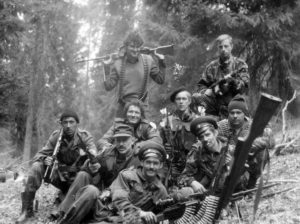
The surroundings of Višegrad, May 1993.
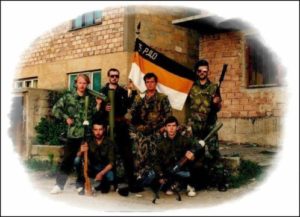
The Third Russian Volunteer Detachment (Sarajevo)
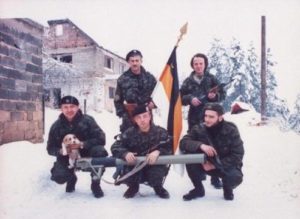
Russian volunteers at the Sarajevo warzone
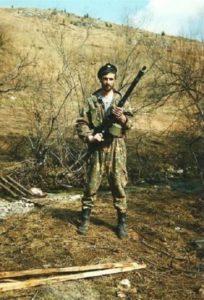
Volunteer in the Army of the Republic of Srpska, Boris Pičugin, Trnovo 1995.
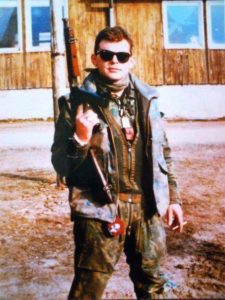
2nd Herzegovina Light Infantry Brigade, Army of the Republic of Srpska. Fighters near Konjic. Russian volunteer Sergei Suharev.
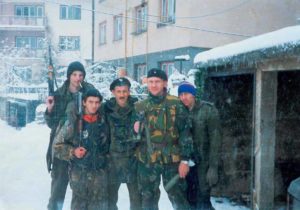
The Third Russian Volunteer Detachment (Sarajevo)
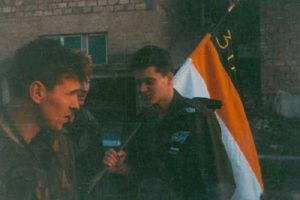
3rd Russian Volunteer Detachment. From the left: Anatoly Astapenkov, Boris Neomenko and A. Kravčenko.
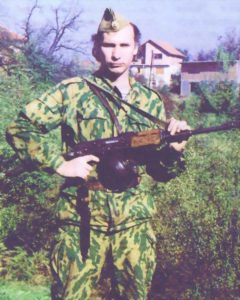
Russian volunteer in the Army of the Republic of Srpska, Mikhail Klevačev.
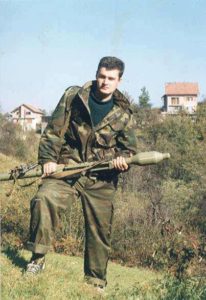
Oleg Dmitrievich Bondarec
Born April 4, 1969 in Kiev (Ukraine). Orthodox Russian. From 1994, he fought as a member of the Serbian detachments in Sarajevo („White Wolves“, the battalion in Dobrinja). He died on November 20, 1995 in Ozren Street. Buried at the military cemetery at Donji Miljevići (Srpsko Sarajevo).
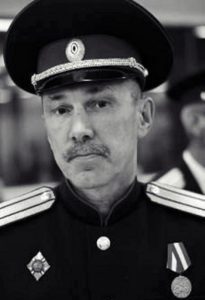
Viktor Zaplatin, Commander of the volunteer Cossack battalion in the Army of the Republic of Srpska.
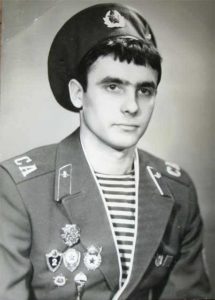
Genadij Petrovich Kotov, born in 1960 in Volgograd. Commanded the Cossack Detachment in the Army of the Republic of Srpska. Died in an ambush on February 9, 1993 near Višegrad, where he was buried within a military cemetery. In 1994, the body was transferred to Volgograd, where his widow and children live.
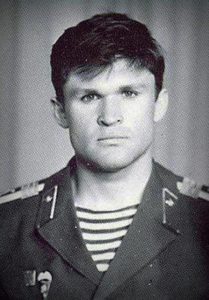
Mikhail Viktorovič Trofimov, born 16.02.1963 in Divnogorsk, Krasnoyarsk region. He commanded the Second Russian Volunteer Detachment in the Army of the Republic of Srpska. He was wounded in Datelj, near Praca and died within Koran hospital in Pale on July 7, 1993. Officer, veteran of the war in Afghanistan. Stuntman of the film studio in Odessa.
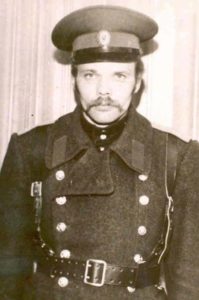
Desjatov Viktor Nikolaevich, born January 12, 1955. Cadet of the children’s home. He participated in the work of the Cossack organization. He lived in the city of Yekaterinburg. Came to the Republic of Srpska in March 1993. He was a member of the 2nd Russian Volunteer Detachment (Goražde) and 3rd Russian Volunteer Detachment (Jewish Cemetery – Srpsko Sarajevo). He died a hero on January 6, 1994, by saving a pregnant woman under sniper fire at the Jewish Cemetery, Srpsko Sarajevo. Buried at the military cemetery in Donji Miljevići (Srpsko Sarajevo).
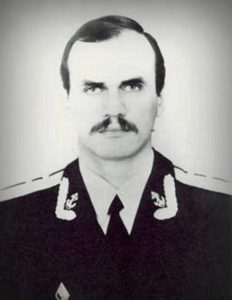
Safonov Vladimir Vasiljevich. Vladimir Vasiljevich was born on May 30, 1957. He was a naval officer, with a rank of second-class captain. His last dwelling was in St. Petersburg. Arrived in the Republic of Srpska in February 1993. He was a member of the Goražde Brigade. Heroically fallen in the defense of the peaks Zaglavak and Stolac on April 12, 1993. He was buried at a military cemetery in Višegrad (Republic of Srpska).
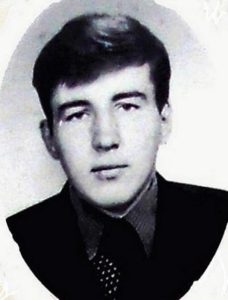
Petras (Yuri) Sergeevich. Born in Belarus in 1967. A member of the detachment “White Wolves” in the Army of the Republic of Srpska. He died on October 11, 1995 in the Hum region (Trnovo). Buried at the Miljevići Military Cemetery.
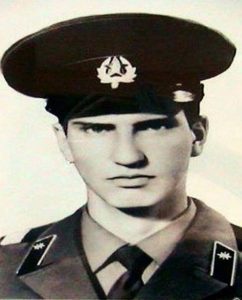
Andrei Nikolaevich Nimenko. Born on September 10, 1971 in St. Petersburg. He served as a machine gunner in the Second Russian Volunteer detachment. He died on December 3, 1992 in Višegrad (Orlova Gora), during the operation to liberate region of Počivala. He was only 21 years old. Buried at a military cemetery in Višegrad.
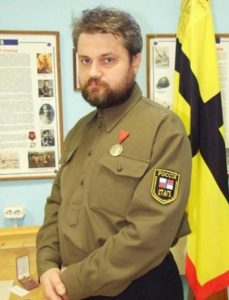
Aleksandar Sasha Kravchenko, one of the younger Russian volunteers in the ranks of the Army of the Republic of Srpska. From Kazahstan. He was badly wounded for the first time at Zaglavak near Višegrad in April 1993, in the head, and the second time in the leg in Sarajevo battlefield in 1994. After the war, he married and fathered a daughter and four sons, three of whom he gave Serbian names. He fought with the Serbs in Kosovo as well, as a volunteer.
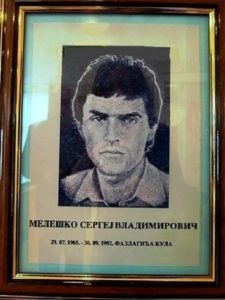
Sergei Vladimirovich Meleshko. He was born on June 29, 1965. In Mineralni Vodi, Stavropol region, Russia. Professor of German and French language. He was a member of special police forces in Riga, Latvia. In Bosnia and Herzegovina since the beginning of autumn 1992. Served within 1st Russian Volunteer Detachment (Bileća, Trebinje). He died in the armored vehicle on September 30, 1992 near Fazlagića Kula near Gacko, from an anti-tank mine. Laid to rest in Bileća. A song, performed with Serbian national instrument, gusle, was written about him and killed Momir Milosević. Order of Merit for the People was posthumously awarded to him, received by his father Vladimir. He was married, has a daughter Alenka. His name is carved into a Serbian memorial in Bileća.
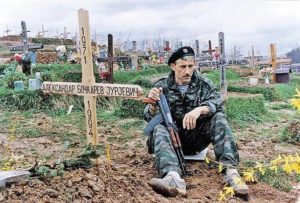
War year 1994. Cemetery in Donji Miljevići (Sarajevo) – Russian volunteer Alexander Skrabov sits next to the grave of his warrior comrade from the 3rd Russian Volunteer Detachment of the Republic of Srpska Army. Only a few months later, Skrabov was buried on the same cemetery. He died on June 4, 1994 during the Battle of Mosevićko Brdo when bullet pierced his neck.
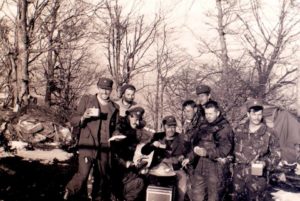
On the summit of Zaglavak near Višegrad, April 1993.
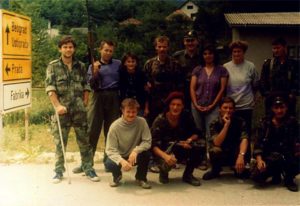
Russian volunteers in the 1st Podgrab Battalion of the 1st Romanija Infantry Brigade of the Army of the Republic of Srpska.
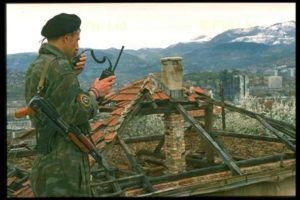
Commander of the 3rd Russian Volunteer Detachment Alexander Skrabov, aka Sasha the Russian.
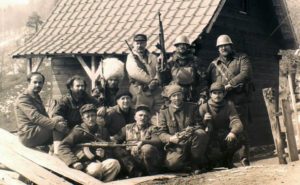
2nd Russian Volunteer Detachment.
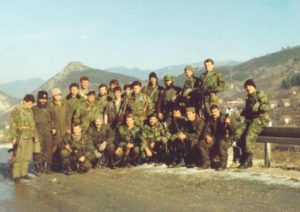
Remembering the heroes of the Battle of the Zaglavak near Višegrad. 2nd Russian Volunteer Detachment.
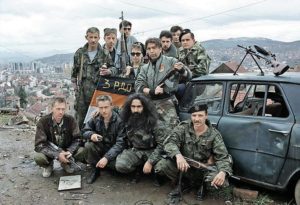
3rd Russian Volunteer Detachment in the Army of the Republic of Srpska, Sarajevo 1993.
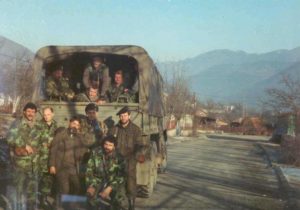
Russian volunteers in the Army of the Republic of Srpska. Višegrad, 1992.
Translate Ljubisa Malenica
Донирајте или се рекламирајте на „Срби у Босни и Херцеговини кроз епохе и судбине“ једином сајту на свијету који описује живот нашег народа на просторима БиХ од насељавања Срба у 7. вијеку до одбрамбено-отаџбинског рата а кроз призме политичке, културне и духовне историје.

